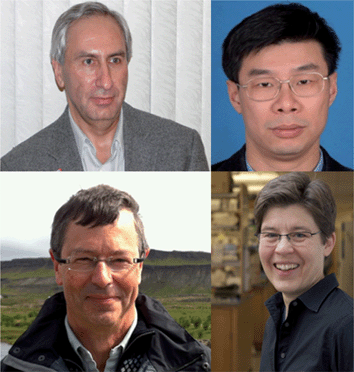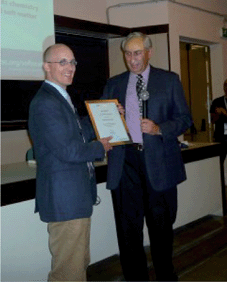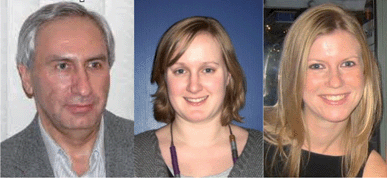DOI: 10.1039/C3SM90160B
(Editorial)
Soft Matter, 2014, 10, 11-12
Welcome to the 10th volume of Soft Matter!
2014 sees Soft Matter enter its 10th volume of publication and we would like to thank all our authors, readers, referees, and past and present Editorial Board members for all their contributions over the years. 2013 has been a very busy year here at Soft Matter and in this Editorial we look back at some of the highlights while looking forward to the year ahead.Changes to the Board
In 2013 we welcomed Michael Rubinstein of University of North Carolina at Chapel Hill, to the position of Chair of the Soft Matter Editorial Board. Michael's research interests are in the area of theoretical soft condensed matter physics with an emphasis on polymer physics. His main scientific contributions include theories of polymer entanglements, dynamics of reversible networks, and models of charged polymers. Michael takes over from Martien Cohen Stuart of Wageningen University who was Chair of the Editorial Board for four years, and we would like to extend our warmest thanks to Martien for all he did for Soft Matter during his time as Chair.Jianbin Huang (Peking University) also joined us at the beginning of 2013 as Associate Editor. Jianbin is interested in the physical chemistry of surfactants, especially in mixed surfactant systems and joins Christos Likos (University of Vienna) and Darrin Pochan (University of Delaware) in handling manuscripts. We also welcomed Peter Schurtenberger (Lund University) and Jennifer Lewis (Harvard University) to the Editorial Board, joining Anna Balazs (University of Pittsburgh), Jian Ping Gong (Hokkaido University), Sam Safran (Weizmann Institute of Science) and Jan Vermant (K. U. Leuven).
 | ||
| Fig. 1 New additions to the Soft Matter Editorial Board: Michael Rubinstein (top left), Jianbin Huang (top right), Jennifer Lewis (bottom right), Peter Schurtenberger (bottom left). | ||
The Soft Matter Lectureship
Now in its 5th year, the Soft Matter Lectureship was awarded to Eric M. Furst (University of Delaware), whose research spans a wide range of topics in soft matter science and engineering, but with particular focus on the physics and chemistry of the colloidal domain. This annual Lectureship was established by the journal to honour a younger scientist who has made a significant contribution to the soft matter field and we would like to congratulate Eric on his award. If you know of someone who deserves recognition for their contribution to the soft matter field then look out for when nominations for the 2014 Soft Matter Lectureship open later this month.Themed Issues
2013 was a busy year in terms of themed issues and we would like to thank all our guest editors. We had an Emerging Investigators issue, an issue on The geometry and topology of soft materials, guest edited by William Irvine (University of Chicago) and Vincenzo Vitelli (Instituut-Lorentz Leiden), a “Directed” self-assembly issue with guest editor Eric Furst (University of Delaware), and an issue on Soft matter under confinement with guest editors Jacob Klein (Weizmann Institute of Science) and Susan Perkin (University of Oxford). All themed (and web-themed) issues can be found under the Themed Collections tab on our website (http://pubs.rsc.org/en/journals/journalissues/sm#!themedcollections) and there will be more highly topical and interdisciplinary themed issues coming in 2014!Looking ahead to 2014 and beyond
As we enter our 10th volume of Soft Matter we wish for the journal to remain true to its roots by publishing only the very best papers, so during 2013 you may have read an Editorial which we published (DOI: 10.1039/c3sm90100a), discussing the future of Soft Matter. We are seeking to publish papers that will push the boundaries of the field and demonstrate the most innovative results. You may have noticed that when submitting papers you will now be asked to provide a short explanation of why the study will appeal to the broad, interdisciplinary readership of the journal and what fundamental issues are addressed in your manuscript. Any papers that do not advance the basic understanding of the material or system will not be considered for Soft Matter. Equally, articles which report routine studies of the synthesis and properties of materials are also not suitable. We want to ensure that the journal continues to serve the community and showcases the cutting edge of soft matter research.Keeping up to date with Soft Matter news
Keep in touch in 2014 by following us on Twitter (@softmatter) and Facebook, signing up for e-alerts (http://www.rsc.org/Publishing/Journals/forms/V5profile.asp) or reading the blogs (http://blogs.rsc.org/sm/) for all the latest news on Hot articles, most accessed articles, Editorial Board news, themed issues and all other journal news.Michael Rubinstein, Chairman; Liz Dunn, Editor; Nicola Wise, Deputy Editor.
| This journal is © The Royal Society of Chemistry 2014 |


